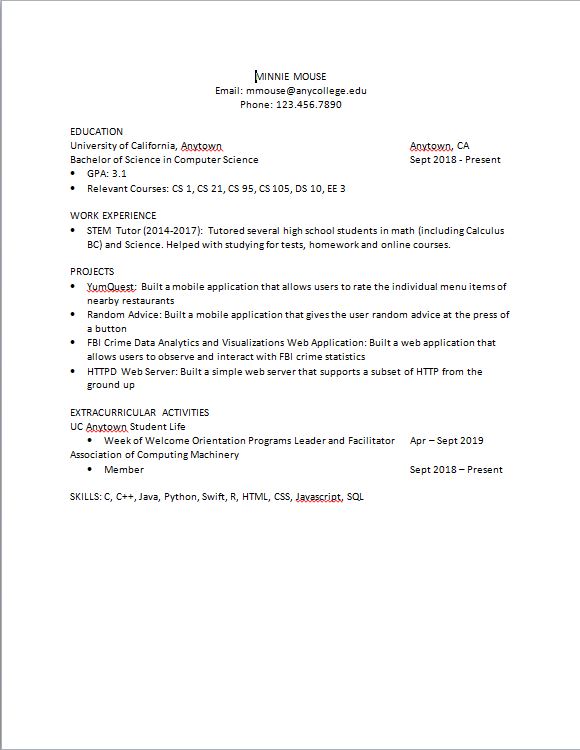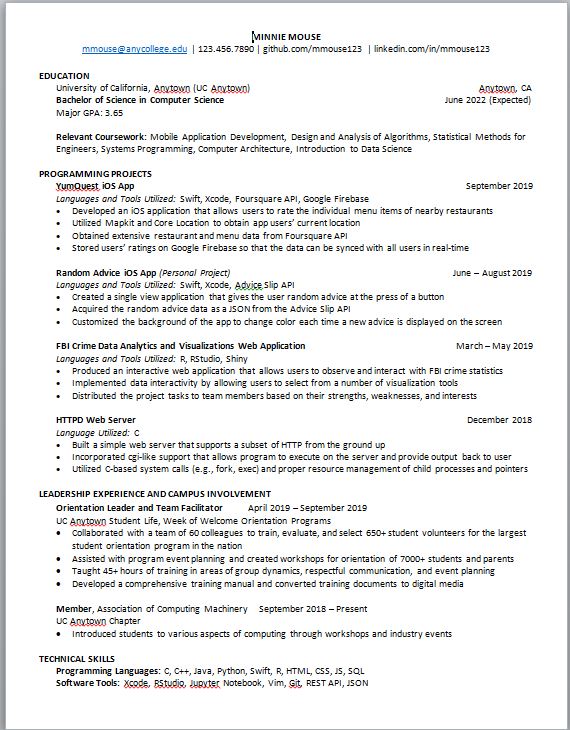Creating a great resume is the first step on the path to securing your dream career. It goes without saying that first impressions count—so you need to write a resume that really reflects who you are and what you bring to the table.
Even while you’re still in college, you’re developing skills and knowledge that will help you transition to the professional world. Oracle campus recruiting program manager Eric Cervantes recommends that your resume should give an overview of these experiences and explain how they will benefit you in your upcoming career. “Always put yourself in the shoes of your target employer and write with them in mind,” he says.
To sum up, your resume should:
- Highlight your potential to an employer
- Sell your skills and experience
- Focus on your unique achievements
- Convey a positive, can-do attitude!
- Provide insight into you as a person
- Be easy to read and logically laid out
How to structure your resume
Personal details: Include your full name and contact details, both mobile number and email address. There’s no need to include your street address, social security identifiers, or date of birth. Make sure you have an appropriate voicemail message and email address for when an employer contacts you.
Educational history: Only include recent information. High school references should only contain school and grading details, academic achievements, and key extracurricular activities. Leave the majority of your resume for college. Specify your expected graduation year, month, and cumulative GPA. Include your majors and minors and any academic awards.
Work experience: List this in reverse chronological order and include any past work experience like internships, part-time work, and volunteering.
Not all of your past roles will directly relate to your chosen industry, but they do say a lot about your work ethic and professional skills. Clearly state the company name, dates employed, department and your title. List your responsibilities rather than just listing tasks. So rather than saying “answered retail banking calls from customers,” you could say “received upwards of 150+ retail banking calls per shift pertaining to a range of issues from account queries, transfers, complaints, and sales inquiries.” You should also list any achievements like “achieved sales quota each quarter” or “awarded representative of the month three times in first year.”
Technical skills: As a college student, you might lack relevant work experience—this is where your college coursework can really help you out. Include any modules or projects that relate to the role and be sure to mention what technical skills, programming languages, and software tools you used.
Extracurricular information: This section is incredibly important. Employers are concerned with more than just your grades, they care about your team-work skills, ability to connect with customers, and whether you can thrive in an international environment. Use this section to provide insight into who you really are by listing your passions and hobbies. Include details of any exchange programs, student clubs, leadership positions, sports, and travel—this helps us get a feel for who you are beyond your GPA.
References: There’s no need to include references—they take up valuable space and it’s a given that they’re available upon request.
Cover letter: Cover letters are not typically required, but they do give you an opportunity to further highlight why you’re suited to a role. Your cover letter should feel genuine and express the unique selling points that differentiate you from other candidates. Talk about your passions and goals here.
Final tips
- Use section titles and formatting to clearly divide your resume
- Select an easy-to-read font and apply a consistent style throughout
- Use bullet points to summarize
- Proofread it. Then proofread it again!
- Save and submit as a PDF to protect your file.
Check out these example resumes to put the advice in action. The first example shows a very basic resume, and the second example shows how to better showcase your experience.
Good luck on your job search! Make sure you check out our recruiters’ tips for interview preparation. Explore our range of career opportunities for students and graduates here.


